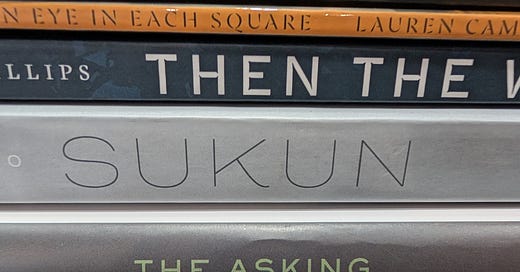Many writers, at the end of a year, share threads or posts of their accomplishments or publications over the previous twelve months. As well they should—in a literary landscape where no one is tooting your horn for you, you’d better learn to play that instrument yourself. I’ve done those posts in the past, but this year, I wanted to focus on some of my appreciations.
I read a LOT of poetry every year, and I like a LOT of these collections. I could not possibly write about every book I enjoyed this year, or I would be typing day and night like those monkeys that will eventually write Shakespeare.
I thought I would share, however, the nine poetry collections that really stuck with me, that were companions, that I keep returning to for one more swim in their oceans. Some are new. Some are not. Some are from small press wonders. Some are from big name houses. I share them in no particular order. Maybe you’ll find something new here to read for yourself.
Todd Dillard’s Ragnarok at the Father-Daughter Dance (Variant Lit)
I wrote about one of my favorite poems from this book here, and I keep re-reading the chapbook to explore Todd’s extraordinary gift for rendering the tenderness and overwhelming oddity & beauty of parenting and grieving.
Molly Spencer’s Invitatory (Parlor Press)
I am a huge fan of Molly’s work, so I wasn’t surprised to love her new collection, but I am enraptured by her ability to make poems that are at the same time liminal and firmly grounded in the world.
Jane Hirschfield’s The Asking: New and Selected Poems (Knopf)
I have spent months dipping in and out of this collection after reading it cover to cover. Hirschfield’s skill at reminding us of our place in nature and history and at appreciating life’s smallest details is a primer on how to be a human in the world.
Carl Phillips’s Then The War and Selected Poems, 2007-2020 (Farrar, Strauss, Giroux)
This book, which carries both a “new” chapbook of poems (Then the War) and functions also as a selected, was the perfect introduction to Phillips’s sprawling syntax. (I admit, I had not read a whole Phillips collection before.) The Among the Trees section is among my favorite things I read this year across genres.
Leila Chatti’s Figment (Bull City Press)
This slim black volume is one of the most devastating sequences of poems about miscarriage/pregnancy loss I have ever read. Its inventive and alphabetical, sequential language pinpoints the desire for control of something that is beyond one’s grasp.
Jenny George’s Asterisk (Bull City Press)
This tiny chapbook of short poems about grief packs a huge punch. The poem that featured lilacs had me in tears missing my mother.
Joan Kwon Glass’s Daughter of Three Gone Kingdoms (Perugia Press)
Joan writes about trauma and heritage and family with straightforward and honest language that doesn’t dramatize, but shines a revealing light on the core subject of each poem through image and declaration. Even though I read many of these poems before they were in the book, reading the book as an entity is a special experience.
Kazim Ali’s Sukun: New and Selected Poems (Wesleyan)
I was excited to be first in line to have Kazim sign this for me at last year’s AWP, and I was not disappointed in what I found inside. I love the wild swings in style and content that show a writer who is unafraid to seek spirituality and truth wherever and however he may find it.
Lauren Camp’s An Eye in Each Square (River River Books)
Lauren’s poems in response to the artist Agnes Martin have their own spare intensity, their own adherence to the almost sacred quality of the line. No word is wasted here.
Heading into the new year, I hope to share more of what I’m reading, maybe as a little header or footer to my usual nonsense. Let’s tell each other about the poets we love. A little appreciation goes a long way.
If you are celebrating a holiday or just the end of this year, I hope that the next week brings you peace, joy, and love.




Thank you for this list! Happy holidays, Donna!